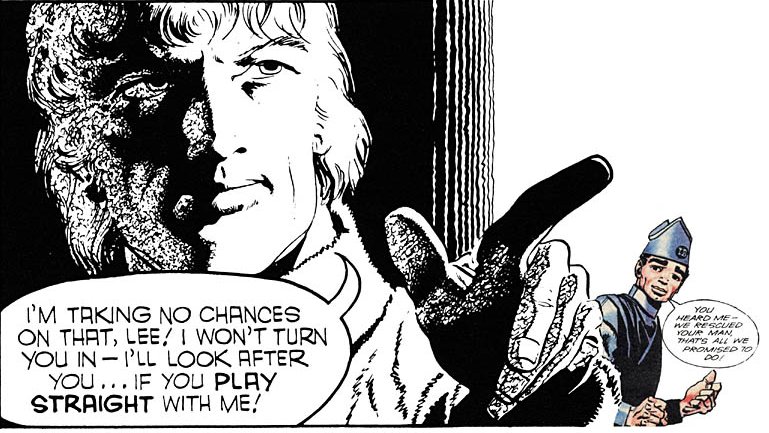|
|
This interview originally appeared in
"Speakeasy"
no. 100 in July 1989 to coincide with an exhibition of
Frank's private and unpublished work and appears
with kind permission of Alan Woollcombe.
|
Nancy Bellamy is a friendly, round-faced woman, given to much
merriment, and great company. Now retired, she lives well away from the bright lights and
seems the very model of ladylike propriety, though in moments of indiscretion she does let
slip now and again about periods when it has not always been so ... |
beginnings |
How did you meet Frank Bellamy?
We met during the War. I was born and bred in County Durham and I was working in
Woolworth's up in Bishop Auckland - I was on the counter that sold toothpaste and things
like that. When Frank was called up, he was stationed nearby at a place called West
Auckland, and of course he soon got his eye on me ... he kept coming and buying tubes of
toothpaste just to get talking to me and wanting to make a date with me - he wouldn’t
leave me alone! In the end, he wore me down: I said ‘All right, I will go out with
you’. However, ,just as I got outside the shop door and he was waiting for me the
blinking air raid siren went and he had to report for duty, so that was the end of that!
Of course, we did see each other again ...
|
While he was in the army, did he produce any artwork?
Oh yes, he used to do an illustration every week for the Kettering Evening
Telegraph, which used to bring out a sporting paper called the pink
‘un. One picture he did in 1942, when he was in the army, was a strip about
Corby football team. Before the football hooliganism started, Corby football supporters
had a reputation for drinking and throwing bottles, and Frank did a strip about that. He
had a very abusive letter back, defending the supporters and saying that he should be a
pavement artist and sit in the gutter, because that’s where he belonged. So the next
week he did one of himself sitting in the gutter with a begging bowl!
|
|
What about drawing for the army?
Well, he was in the Royal Artillery, and he did a plan of the estate of the Duke of
Portland at Welbeck Abbey in Worksop, Nottinghamshire, to be issued to the troops. His
colonel showed it to the Duke who wrote and thanked him for it. That was when he had been
promoted to sergeant. |
|
You both then moved down to Kettering, Northamptonshire - did you find that quite a
change?
Oh yes. I couldn’t settle for a long time, though Frank of course was born and bred
in Kettering - he had a Kettering accent, though when we were together having a laugh, I
used to go very broad with my north country accent on purpose, and in the end I had him
speaking like me!
|
|
What were his passions?
He loved movies, the westerns and tough guys - Edward G (Robinson) and
people like that. And of course, he had the fascination for drawing and also for Africa
and all it stood for - the big game and the big cats. That’s why he used to love the
little domestic cats too. Whenever there was a circus in Kettering, as a boy he would go
down and spend all his time hanging around the big cats’ cages. Once, when he was a
little boy of six or seven, he went up to a lion’s cage and pulled some hairs out of
its tail! He put them in a bottle and kept them for years.
|
|
Did he ever go to Africa?
The nearest he got was to North Africa. We went on holiday to Morocco, and the first thing
he did as he stepped off the plane was to photograph his foot on African soil. He was
absolutely mad in things like that! Of course, he used to draw for the Outspan magazine
quite regularly. He aIso did an illustration for King Solomon’s Mines, which
appeared in Everybody’s Weekly, which is long gone. In fact, the
famous painter, Sir William Russell Flint, had done a similar
illustration years before, and he wrote Frank a lovely letter to say how much better
Frank’s one was than his own.
|
the artist at work
|
How did Frank get into strip cartoons?
When he first decided to go freelance after we moved down to London in 1949, or even
before, he used to draw for Home Notes, and he hated those sort of girlie
illustrations, static things which he hated drawing. It wasn’t his cup of tea at all,
but he did them for the money. He wanted to draw something with a bit of guts to it. Then
his agent got him the job for Gibbs Dentifrice toothpaste (solid toothpaste in a tin) and
he did a strip: your teeth were ivory castles and if you didn’t brush them twice a
day with Dentifrice, Giant Decay would attack them. From that he went on to Mickey
Mouse Weekly, and then Hulton Press saw his potential and approached him
themselves direct to draw for Swift.
|
 |
For those early illustrations, was he told to draw
them in a particular way or was it left up to him?
He would do his own interpretation. Mind you, if they didn’t like it, they would
sling it back at him and he would sometimes have to do a piece one, two or three times
again until it suited them. Of course, his name wasn’t known then.
|
|
What did he like drawing in particular?
He loved drawing westerns, he loved drawing action, a shoot-out with bodies flying through
the air. Another thing he really loved drawing was an explosion, and the bigger the
explosion, the better he liked it! He did loads of life drawings of professional models
from a school of modelling in London: he had a little red book with all their names and
telephone numbers and I used to pull his leg about it. I don’t know what happened to
that book, somebody must have pinched it! (Laughter).
|
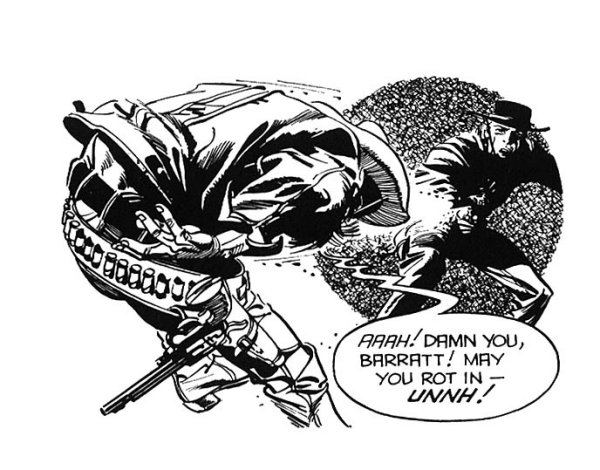 |
Did he do much research?
He used to get booklists from a lot of booksellers in London and Soho, and he knew exactly
what he was looking for - he had some quite rare books. He used to read them till you
could ask him anything and he could answer you, and he knew what he was talking about.
|
|
Did he work from home?
Oh yes, though he went up to London twice a week because he wanted a break away from his
monotonous life. Mind you, I used to make him laugh quite a lot. He used to have the back
bedroom upstairs as his studio, and the only aids to drawing that he had were his camera,
a 35mm Leika, and a full-length mirror which was propped up near his desk. I sneaked
upstairs one day and saw him pulling a face in the mirror - it was just as if he was
threatening himself. Well, I just put my head around the door and said, "You bugger,
it's me!" Of course, he started to Iaugh and couldn’t draw for some time.
|
|
Did you ever pose for him?
Yes, though I hated posing because I had to sit still for such a long period of time.
Anyway, he begged me so much that I relented and let him draw me. There was a little story
attached to it: when the drawing was hanging in the Camberwell Art Gallery, we got a phone
call from Antony Crossland the MP and minister, who said he would like
the name and number of the model. I understood that at that time the House of Commons had
their own little painting group which they must have used for relaxation. Anyway, my
husband said "It’s my wife" and got quite embarrassed, so that was the end
of the conversation!
|
glory days
|
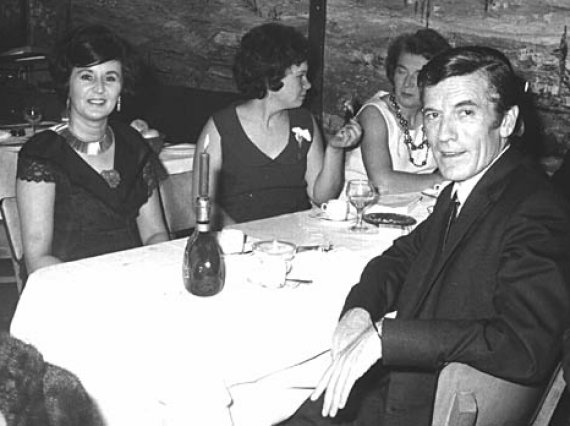 |
Once he was established in his career, how did Frank relax off-duty, as it were?
We became members of the Swallow Club, a very nice, select little nightclub in Piccadilly,
in Swallow Street. It was founded by the sculptor Sir Jacob Epstein for
just artists, and then they allowed other professions to come in - writers, actors,
musicians. The original Rolling Stones used to go there. Before you were
allowed in, you had to go before a committee and be vetted like mad. Frank got in with
ease and I was accepted, being his wife. In the end they asked us if we’d like to be
life members, which was an honour.
|
|
He didn’t come across any snobbery about the fact that he was working for comics?
Oh no, because he was classed as an illustrator. In fact he asked for the loan of some of
his Churchill and Montgomery originals and he had an
exhibition down at the Club with those. We noticed Clive Dunn, the actor,
looking at them one night and we got very friendly with him.
|
|
What happened to the Club? Are you still a member?
No, the Club packed up overnight so we started going to Antonio’s Spanish restaurant
and got to know the owner, Benito de Pablos. It was great - it was in the
cellar, intimate and small, and you had wonderful food. It was the place where Paco
Pena (the flamenco guitarist) started playing. Anyway, we both loved flamenco
dancing and from nine till twelve they had flamenco playing on a little tiny stage. Then a
little group would come on and there was more dancing, and we used to be there till five
o’clock the next morning. It was great.
|
|
Did you ever go to Spain?
Oh, we used to go to Spain quite a bit on holiday - we both liked it very much and of
course the flamenco dancing. We stayed in Cordoba once, with all the bullfights. Frank
went just to see the spectacle and the colour, and he would be sketching and clicking away
with his Leika. I hate bullfighting so I refused point blank to go, but all the
bullfighters were staying at our hotel so I saw them in all their finery anyway. Frank of
course got their autographs! Another time we were in Seville, going down a very narrow
street, when a Spaniard came flying past so fast on a scooter that we had to hunch up
against the wall Frank made a pass as if with a bullfighter’s cape and went
"Ole!" That put the fat in the fire - the man went berserk! He came back on his
scooter and said - in Spanish - "Because you made a pass at me you called me a bull,
so my wife is a cow!" A crowd gathered, but eventually the courier calmed him down
and off he went. Frank was always like that - he was always full of fun.
|
|
What prompted his move from EAGLE to
TV CENTURY 21?
Gerry Anderson wanted Frank to illustrate ‘Thunderbirds’
so Alan Fennell (editor of TV Century 21) took us over
to meet Gerry and Sylvia. He showed us all round the studios, showed us how they made the
scenes and the puppets work so Frank agreed to illustrate ‘Thunderbirds’.
Eagle was going down the drain anyway. The only thing was, be hated drawing
puppets, so he made all the puppets look more human.
|
|
Did he have models to work
from?
Just
the heads, white heads. The funny thing was, they were ever such ghastly things, and I was
always playing jokes on my son David. One night he came in really late so I had got all
these heads and arranged them along the pillow on his bed, and then covered them up with
the sheet. When he came in, there were all these ghostly heads grinning at him, dead
white... oh, I heard him scream!
|
|
Why did Frank leave
‘Thunderbirds?
TV Century 21 folded - he left because it folded. I can’t remember what he did next,
but very soon afterwards he had a phone call from out of the blue from The Daily
Mirror: would he like to draw ‘Garth’? He just said
"I’Il have a word with my wife", because he always used to consult me, the
bosswoman (laughter), and I said "Ask how much they’re going to pay you
first". When they did mention the sum, it was a big drop in salary for him, so he
said "I’d love to draw it, but not at that price - I could sell the bloody
things and get more money for them!" He was quite infuriated, so they upped the price
straight away to a more sensible salary, and they said it would increase after a while, so
that was the way he accepted."
|
home
|
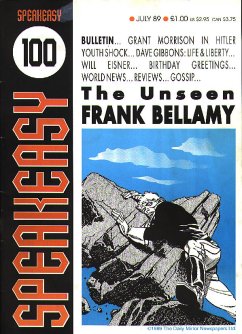
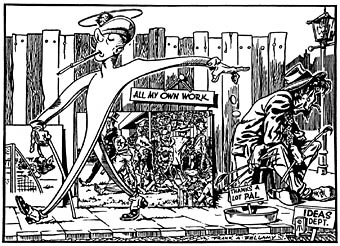
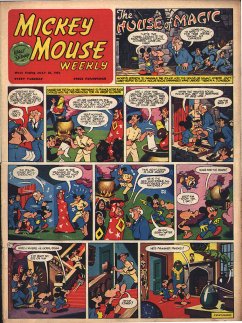
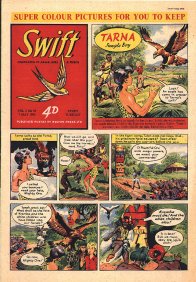
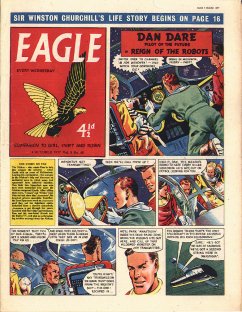
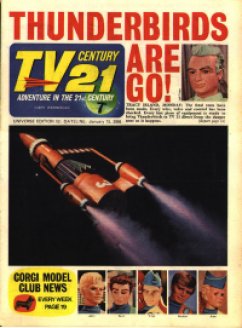 |









